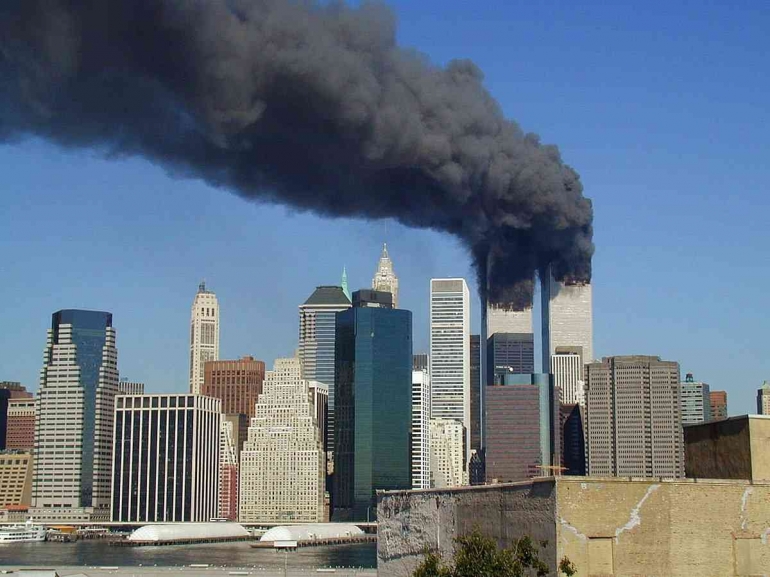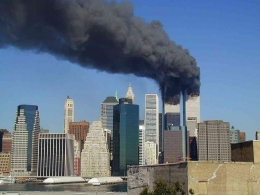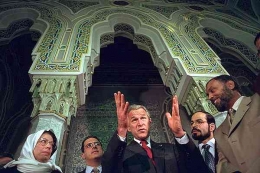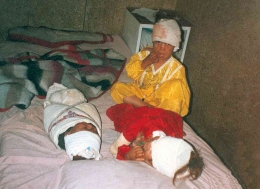The September 11 attacks, also known as "9/11," were four coordinated suicide terrorist attacks carried out on September 11, 2001, against the United States by the militant Islamist extremist network al-Qaeda.
Al-Qaeda is a Salafist jihadist-led global violent Sunni Islamic extremist network. Its members are predominantly Arabs, but others may join as well. During the Soviet-Afghan War in 1988, Osama bin Laden, Abdullah Azzam, and other Arab volunteers established the network. Al-Qaeda militants believe that a Christian-Jewish alliance (headed by the US) is plotting to wage war against Islam and destroy it.
Four commercial planes flying from the Northeastern United States to California were seized by 19 terrorists. The hijackers smashed the first two planes into the World Trade Center Twin Towers in New York City, and the third plane into the Pentagon (the United States military's headquarters) in Arlington County, Virginia. The fourth plane was supposed to crash into a federal government facility in Washington, D.C., but it instead landed in a field after a passenger resistance. Nearly 3,000 people were died in the assaults, which ignited the global war on terror (Invasion of Afghanistan and Iraq).
The attacks caused profound and widespread changes in American politics and international policy. Both parties came together to support new or improved anti-terrorism laws on the domestic front. This law has received substantial funding from western nations. There have been 119,044 anti-terror arrests and 35,117 convictions worldwide since 9/11 as of 2011.
Identifying the cause
The Al-Qaeda movement arose as a result of the Islamic resurgence and development of the Islamist movement following the Iranian Revolution (1978-79) and the Afghan Jihad (1979–89). Many experts believe that the Al-Qaeda organization was inspired by the ideas of Islamic philosopher and thinker Sayyid Qutb.
In the 1950s and 1960s, Qutb preached that the Muslim world was no longer Muslim and had reverted to pre-Islamic ignorance known as jahiliyyah due to the lack of sharia law. Qutb believed that in order to revive Islam, a vanguard of righteous Muslims was required to build "real Islamic governments," enforce Sharia, and rid the Muslim world of any non-Muslim influences. Qutb envisioned this vanguard pushing forward to fight tyrannical regimes with armed Jihad.
The Age of Sacred Terror, a book by Daniel Benjamin and Steven Simon, stresses the fact that the 9/11 terrorist attacks had a solely religious motivation. They are regarded as "a sacrament... meant to restore to the universe a moral order corrupted by Islam's foes." It is not political or strategic, but rather an "act of atonement" intended to "humiliate and slay those who defied God's rule."
In the 1990s, Osama bin Laden, the head of al-Qaeda, declared a holy war on the United States and issued two fatwas, in 1996 and 1998. Bin Laden harshly denounced both American military engagement in the Arab East and the American government's financial support of the Saudi royal family in these fatwas.
Both documents were first published in the Al-Quds Al-Arabi daily in London, which is published in Arabic. In his 1998 fatwa, Bin Laden said:
"We -- with God's help -- call on every Muslim who believes in God and wishes to be rewarded to comply with God's order to kill the Americans and plunder their money wherever and whenever they find it. We also call on Muslim ulema, leaders, youths, and soldiers to launch the raid on Satan's U.S. troops and the devil's supporters allying with them, and to displace those who are behind them so that they may learn a lesson."
Vengeance
Raymond Ibrahim, a Library of Congress researcher, discovered a substantial discrepancy between Al Qaeda's statements in English aimed at a Western audience and Al Qaeda's Arab messages and papers aimed at an Islamic audience. The Western-directed messages used the "language of justice" to express frustrations as justifications for revenge. Theological motivations in Islamic literature lacked parallels to Western governments' behavior. Image below shows Paths of Vengeance created by Leland R. Beaumont:
Strive for Sharia Law
Sharia or sharia law is the fundamental Islamic religious law based upon Islamic religious principles, specifically the Quran and Muhammad's ideas and life example (Hadith and Sunnah), which are the primary sources of sharia. Sharia is a major source of legislation in many Muslim countries.
Saudi Arabia, Sudan, Iran, Iraq, Afghanistan, Pakistan, Brunei, the United Arab Emirates, Qatar, Yemen, and Mauritania are among those that follow all or most of Sharia. Sharia-prescribed punishments such as beheading, flogging, and stoning are still used in these countries, either judicially or extrajudicially.
Many scholars believe that one of the motives for the September 11 attacks is globalization, which was born in the west and is changing or making some Muslim countries abandon Sharia law.
The Effect on the Muslim Population in the United States
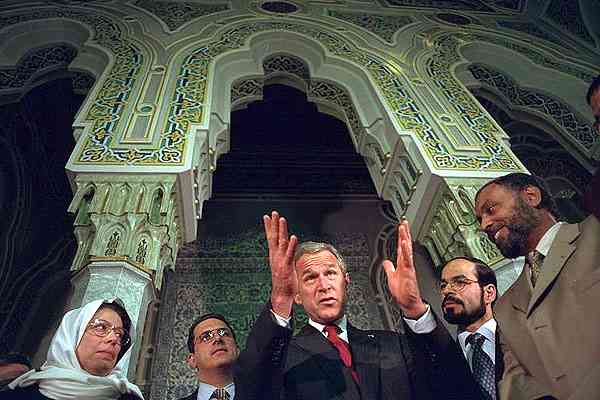
Six days after the attacks, President Bush made a public appearance at Washington, D.C.'s largest Islamic Center, recognizing the "very vital contribution" made by millions of American Muslims to their country and calling for them to be "treated with respect."
In the days following the September 11th incident, numerous cases of harassment and hate crimes against Muslims and South Asians were reported.
Between September 11 and September 17, 2001, 645 bias incidents against Americans of South Asian or Middle Eastern heritage were reported in the media, according to a report by the South Asian American advocacy group South Asian Americans Leading Together. Numerous crimes were recorded, including vandalism, arson, assault, shootings, harassment, and threats.
According to Debra L. Oswald's research Following 9/11, the nation experienced an increase in hate crimes committed against people of Middle Eastern background, going from 354 cases in 2000 to 1,501 incidents in 2001.
In September 2007, Zohreh Assemi, an Iranian American Muslim nail shop owner in Locust Valley, New York, was robbed, beaten, and dubbed a "terrorist" in what investigators call a hate crime.
Assemi was kicked, slashed with a box cutter, and smacked with a hammer. The attackers, who took $2,000 from the salon and wrote anti-Muslim obscenities on the mirrors, also warned Assemi to "get out of town" and that her type was not "welcome" in the area. Friends and family say the incident came after two weeks of phone calls in which she was labelled a "terrorist" and ordered to "get out of town."
Ahmed H. Sharif, a taxi driver in New York, was attacked on August 25, 2010, after a passenger questioned as to his religion.
According to a statement from the New York Taxi Workers Alliance, Sharif, a father of four who arrived in the country from Bangladesh 25 years ago, has been operating a taxi for over 15 years. He said in the statement, "I've never felt this hopeless and insecure before.
Experts claim that the incident happened at a time when tensions in the city were particularly high due to plans to establish an Islamic center and mosque close to the scene of the terrorist attacks of September 11, 2001.
Human Rights Watch found that 20% of Arab-Americans surveyed in May 2002 had directly experienced prejudice since September 11. According to a July 2002 survey of Muslim Americans, 57% had seen bigotry or discrimination and 48% said their lives had worsened since September 11.
The U.S Equal Employment Opportunity Commission (EEOC) documented 488 complaints of employment discrimination, 301 of which were from people who had been fired. Similarly, by June 2002, the United States Department of Transportation (DOT) had reviewed 111 September 11th-related complaints from airline passengers who claimed that their religious or ethnic look had caused them to be marked out during security checks.
The incident has fueled long-standing Islamophobia in the United States.
George W. Bush and War on Terror Criticism
The war on terror, formally known as the "Global War on Terrorism" (GWOT), is an international counterterrorism military campaign launched by the United States in the following of the September 11, 2001 attacks.
The "war on terror" use war as a metaphor to depict a range of tactics taken to combat international terrorism that fall beyond the traditional definition of war. On September 16, 2001, George W. Bush, the 43rd President of the United States, used the phrase "war on terrorism."
The initial fight was aimed at al-Qaeda, with the major theater in Afghanistan and Pakistan, an area nicknamed "AfPak" later on.
In 2009, A criticism about war on terror by former United States Attorney General Ramsey Clark said in an interview that:
"Most of the politicians are putting it as Islamic terrorists, but what they really mean is the threat of Islam, so the idea of the war on Islam is the idea of extermination of a proportion never seen in history at any time."
According to Francis Yoshihiro Fukuyama, an American political scientist, "terrorism" is a tactic, and calling it a "war on terror" obscures differences between conflicts such as those involving anti-occupation insurgents and international mujahideen. with a military presence in Iraq and Afghanistan and the collateral damage that comes with it. The War on Terror caused total changes in U.S foreign policy towards Muslims Countries.
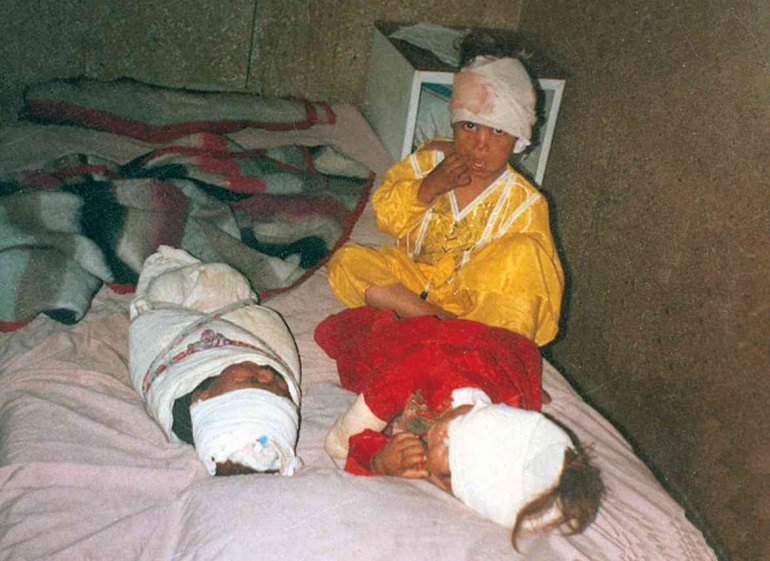
The number of people who have died thus far in the War on Terror, as it has been defined by the Bush Administration to encompass the war in Afghanistan, the war in Iraq, and operations elsewhere, is not a statistic that is generally accepted.
The overall number of estimated casualties is estimated by the International Physicians for the Prevention of Nuclear War, Physicians for Social Responsibility, and Physicians for Global Survival to be between 1.3 million and 2 million.
Between 480,000 and 507,000 people are estimated to have died in Iraq, Afghanistan, and Pakistan as a result of the War on Terror in another study conducted by Brown University's Watson Institute for International and Public Affairs in 2018 and 2019.
The multitrillion dollar, decade-long War on Terror has cost significantly more than was anticipated and is supported by hypocrisy.
According to a number of western media sites, including Time and The Guardian, the accused mastermind of the September 11, 2001, attacks was a member of the mujahideen, who were financed, armed, trained, and helped by the CIA to fight the Soviet Union after it intervened in Afghanistan in 1979.
Conclusion and Opinion from author
Islam as a religion and the Muslim community in the United States have been affected negatively by the September 11 attacks, which ignited the worldwide war on terror. These effects include hate crimes, discrimination, racial profiling, and Islamophobia.
In contrast, the author strongly opposes the September 11 assaults carried out by Al-Qaeda's Islamist radicals, regardless of their motivations. Both the World Trade Center attack and the War on Terror have resulted in the deaths of millions of innocent citizens because to some old man's desire.
The author of this article discovered certain ironies in the American response to the September 11 attacks after conducting research for it. The Global War on Terror, which was intended to eradicate all terrorist organizations, has evolved into some international and multi-armed organization that has contributed to the destabilization of the Middle East. It's interesting to note that since the War on Terror was declared, the number of so-called "militant Islamist extremist networks" has grown.
Follow Instagram @kompasianacom juga Tiktok @kompasiana biar nggak ketinggalan event seru komunitas dan tips dapat cuan dari Kompasiana. Baca juga cerita inspiratif langsung dari smartphone kamu dengan bergabung di WhatsApp Channel Kompasiana di SINI




